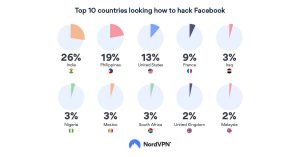The lockdown has inspired people to try new hobbies. For example, in spring, the infamous TikTok social media platform was oozing with dog training, cinnamon rolls, and dance challenges. But some internet users opted for more peculiar hobbies. The number of Google searches related to the keyphrase “how to hack” went up in April 2020, so experts from NordVPN looked into what exactly people were trying to hack. The results have shown that half of users from the UK (46%) wanted to know how to break into somebody else’s Facebook account, while one third of users desired to obtain access to a Wi-Fi (33%).
The researchers analysed the monthly search terms and found an average of 171,490 Google searches worldwide on how to hack something. The UK came ninth on the global list of Facebook wannabe hackers.
“There is more to that: Facebook is the most popular social login to access third-party sites. According to the Dark Web Price Index, that’s why Facebook accounts sell for $75. Once obtained by a cybercriminal, Facebook accounts can open the gates to Instagram, online stores that hold credit card data, and even more,” says Daniel Markuson, a digital privacy expert at NordVPN.
The Top 3 countries where people are the most interested in breaking into somebody else’s Facebook account are:
- India 26%
- The Philippines (19%)
- The United States (13%)
More from News
- How Meta Is Helping The UK Government With Public Services
- Recent Studies Show The Mental Health Risks Of AI Therapy Choices
- How Did A Fake AI-Generated Band Fool Thousands Of Listeners?
- What Influences Bitcoin Prices And Fluctuations?
- World’s First AI Chef To Come This September. Here’s How It Works
- Microsoft Who? Nvidia Has Officially Become the First Company to Surpass a $4 Trillion Market Cap
- Are AI Startups Investing In Teachers Learning AI A Good Move For Education?
- Can a Robot Really Perform Surgery Without Human Help?
What Else do People Want to Break into?
When analysing the volumes of “hack”-related keywords, NordVPN’s researchers found that Wi-Fi comes second on the most desired hacking list. Wi-Fi has always been a target, but the interest increased once people got locked down and had to work or study from their home environment. The Top 3 countries where people are looking to take advantage of their neighbour’s network include India (23%), Indonesia (13%), and the United States (8%).
The rest of the Top 5 things the British want to hack include Gmail (15%), email (5%), and Google account (1%).

How to Protect Your Data
“People may think they are of no interest to hackers. But they are, and research proves it. Your neighbour may be a hacker trying to break into your Wi-Fi network. Your ex-partner may try to get control of your social media accounts. And, of course, a random black-hat hacker will grab any chance to sell your account on the dark web,” says Daniel Markuson.
Hackers are good at finding their ways, whether they search for tips on Google or on the dark web. But you can make it harder for them by following a simple routine of cyber hygiene:
- Use unique and complex passwords for different accounts. Once hacked, your credentials can be checked against other services, such as email or online banking. To help you navigate through the sea of passwords, use a password manager like NordPass, which generates secure passwords and stores them in a protected vault. This applies to your Wi-Fi router too
- Use two-factor authentication. Just entering a password won’t be enough; hackers would also have to get access to your phone or email
- Avoid poorly protected public Wi-Fi. If you have to log in to your online account on a network you can’t fully trust, use a VPN like NordVPN to make your connection private. A VPN encrypts all communications passing between your device and the internet so no outsider can intercept it
For an exclusive discount on a VPN from NordVPN – Sign Up Here



